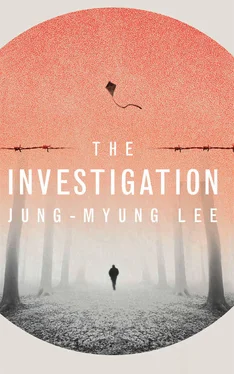‘Are you saying he was trying to trick you?’
‘Obviously! He’s realized that the patients suffer from one or two side-effects. He’s using memory loss, which is fairly common. If he really couldn’t remember his prisoner number, he would have looked down at his uniform. But he didn’t. And he remembered his release date and even recited the multiplication table. You saw that yourself!’
‘But he didn’t recite the multiplication table the way most people do. He didn’t say nine times one is nine, nine times two is eighteen. He just blurted out the answers directly.’
‘So?’
‘What I mean is, he didn’t recite the table. I think he had to calculate it. He wasn’t multiplying; he was adding nine to the last number.’
‘It doesn’t matter. If he can add in his head, it’s clear that his brain function is good. I think we’re done here. You can escort the prisoners back.’
I wanted to say something else, but my lips wouldn’t comply. I spun on my heel and left the room.
The prisoners were lined up in two rows in the dark corridor. As I called out the prisoner numbers one by one, hoarse voices wheezed out in reply. ‘Forward, march!’ I called out, spitting out my resentment. The men’s shackles began clanking on the cold, hard floor. I wanted to turn around to make sure that Dong-ju was fine, but I stopped myself. I didn’t want him to see the sorrow in my eyes.
IF SPRING CAME TO MY STAR
The air strikes became more frequent. Japan turned into an enormous barracks and Fukuoka was the front yard for the US Air Force. The bleak warning of the urgent air-raid siren always came as the prelude to death and destruction. B-29 bombers were turning the city into ash. The sirens blared on, a requiem both for the burning city and for the people who were buried under it. Women with buckets scurried through the bombed streets to stamp out fires. People tried to forget the sirens, the buzzing of aeroplanes, the explosions and screams, recalling instead the other sounds that had once filled these streets — the laughter of children, jazz music coming out of record shops, women’s delighted laughter. War had transformed everything. Streets resonated with the sound of heavy boots, shops were shuttered, military trucks filled with terrified young male conscripts. People were weighted down with terror. Death had become a routine affair and survival was the only goal. Hard labour continued in lockstep with the war. More and more military uniforms were needed; the prisoners washed, mended and re-dyed military uniforms that were soaked in blood and torn by shrapnel. Dong-ju’s job was to pull carts piled high with blood-stained uniforms. When the siren sounded, signalling the start of the prisoners’ outdoor break time, Dong-ju stood in the yard and looked up at the grey sky, whistling.
I approached him one afternoon. He smelled sour. Strangely, it was a welcome odour; it meant that his body was still functioning. I followed his gaze up to the sky, which stretched low over the yard like a faded piece of grey fabric.
Dong-ju looked at me. ‘It’s been three days. I haven’t seen the blue kite that usually flies up around this time.’
‘Well, I’m sure someone flew that kite out of curiosity,’ I said. ‘He had fun cutting your line, but when we banned kite-flying, he got bored and left.’
‘That girl didn’t fly the kite just to cut my line. The way she flew the kite — it was delicate. Sophisticated.’ He explained that it had been like a waltz. The girl gently tugged at his line like a shy girl at her first ball. He would lead her kite, like a young man wrapping an arm around her waist. They had performed a beautiful dance in the sky. He could sense her careful consideration through her line.
‘Why would she do that?’ I asked.
‘Maybe she was lonely,’ he said. ‘She would often put the weight of her kite on my line, as if she were a puppy cavorting on her master’s lap. Her purpose wasn’t to boast how well she could fly, but to lean against someone.’
I didn’t know what he was talking about. How could anyone show their feelings through kite lines?
Dong-ju looked up at the sky beyond the walls, searching for the blue kite again.
‘She probably lost interest in flying it,’ I said.
He looked at me hopefully, but quickly grew dispirited. It was then that I finally understood what he was concerned about. Three days before there had been terrible bombings. Dong-ju told me that he’d stood in the middle of his cell, listening to the explosions. The Korean prisoners had loved it; they’d prayed for the B-29s to turn the city into a fire pit, even if it meant that they, too, would be swept away by the carnage. He rounded his shoulders. ‘I just want to make sure that she’s alive. I wish I could fly a kite. If I could fly mine, I know she’d definitely fly hers. ’
‘Kite-flying has been banned,’ I said, feeling suddenly anxious in the face of his despair. ‘I’m sure there’s another way to confirm that she’s safe.’ I hoped he wouldn’t press me. The siren blared from the speakers on the roof, signalling the end of break; Dong-ju jumped up and went back to his cart.
The next day, after rehearsal, I cautiously brought up the matter with Midori. I asked if she could find out about a young girl who flew a kite near the prison, even though I didn’t know her name or what she looked like. Midori didn’t answer. Instead she placed her hands on the keys. I shouldn’t have asked; it was presumptuous of me. Two days later, I saw Midori again, and light returned to my life. We walked side-by-side on the frozen snow, our shoes crunching. I stole a look at her delicate profile, feeling anxious.
‘I know where she lives,’ Midori said. ‘Her house is on the outskirts of the city, closer to Fukuoka than Hakata Bay, in a neighbourhood with about twenty shanties clustered together.’
‘How do you know that?’
‘I’ve gone to her house before. On behalf of Sugiyama- san .’
‘What happened to her? According to the paper, the road linking Hakata Port to downtown Fukuoka suffered the most damage.’
‘The bombs dropped along the road and destroyed the neighbourhood. I could still smell gunpowder in the air. Because it’s a poor neighbourhood that’s out of the way, they didn’t have any bomb shelters.’
My blood chilled. It would have been better if I hadn’t found out.
She continued, her voice cracking. ‘I managed to find her mother in a temporary ward at Fukuoka City Hospital. A beam fell from the roof and broke her leg.’
‘And the girl?’ I almost couldn’t bear to ask.
‘Thankfully, she left Fukuoka before the attack. Following the government’s recommendation for evacuation, she was sent to her grandmother’s house in the countryside. It’s a farming town an hour away from here, so they wouldn’t have been bombed.’
My body surged with relief, as though a furnace had been lit inside. All I needed was for the girl to be alive. It didn’t matter where she was.
Midori handed me a white bundle and nodded for me to open it. Inside was a battered, yellowed paper kite. The rounded stake in the middle was broken.
‘Her mother was asleep when she woke to the sound of bombs exploding,’ Midori continued. ‘She was running down the stairs when it occurred to her that she should take her daughter’s cherished kite. When the girl left for her grandmother’s house she took all the kites she’d won in battles, but she’d left this one hanging on the wall in the attic, telling her mother to look at it whenever she missed her. There was an explosion, and her mother lost consciousness. She was found clutching this kite to her chest.’
Midori told me that this had been the first kite the girl had won, and that her mother had told her that flying the kite had been her lonely daughter’s sole source of happiness.
Читать дальше












